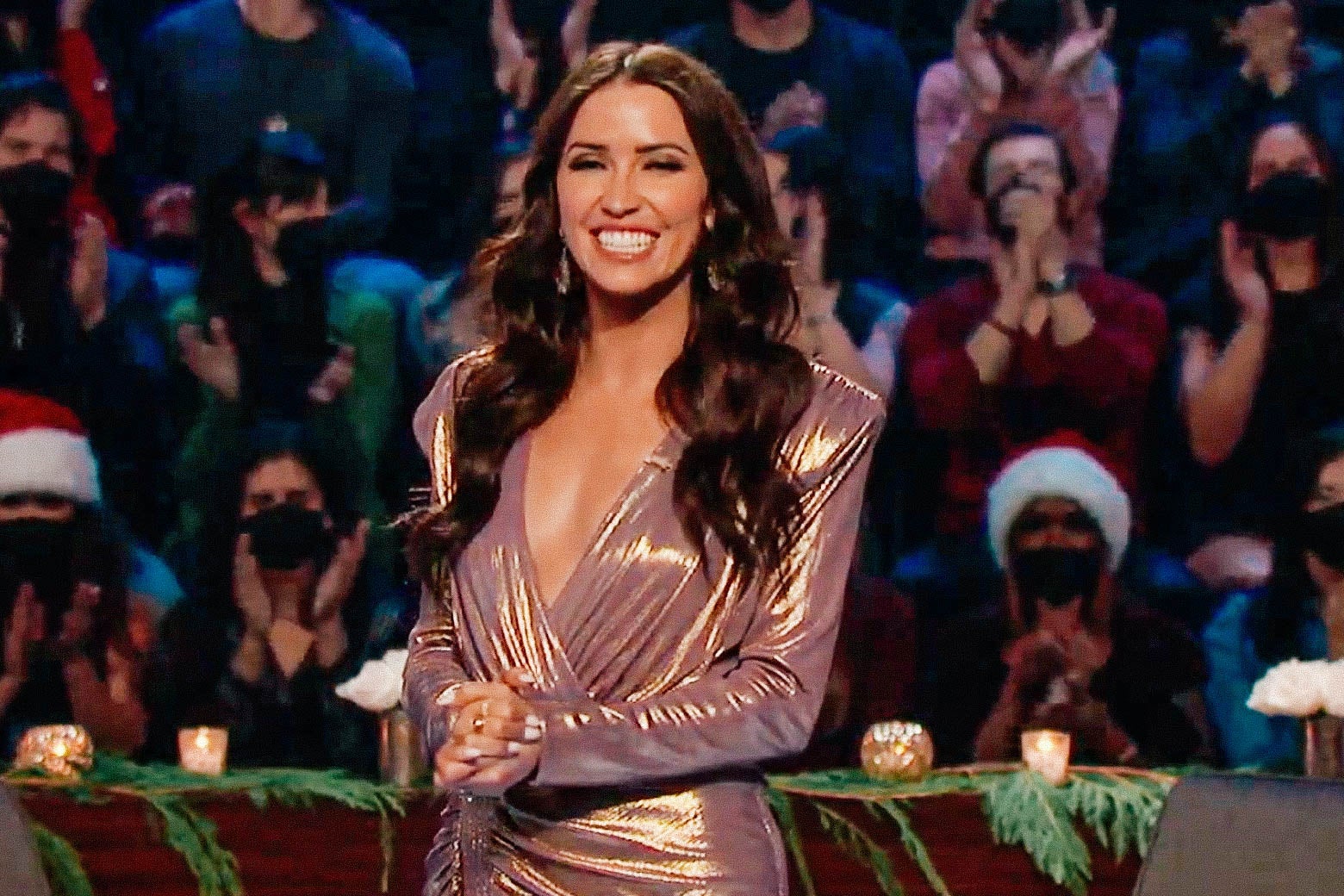Tuesday night’s finale of The Bachelorette was pretty typical, in many respects: The show’s lead, Michelle Young, ended things with one of the finalists, Brandon Jones, and got engaged to the other, Nayte Olukoya. As is customary, a live studio audience was on hand to watch the conclusion of a reality saga that was filmed months ago. Then the season’s principals reunited onstage for an “After the Final Rose” post-show special, in which Young alternated between gushing over her fiancé and sitting down with the man whose heart we all just watched her break in front of all of Bachelor Nation. But if and when future anthropologists study tape of the Season 18 finale, they’ll notice something strange happening in real time: the pandemic creeping into the frame.
Over the last nearly two years, the novel coronavirus has done plenty to disrupt the stalwart march of young men and women vying for true love (and Instagram followers) on national television. In summer 2020, the franchise skipped the usual beach-and-drinking fest Bachelor in Paradise in favor of a weekly clip show in which former host Chris Harrison provided commentary from behind a desk, with his college-bound son standing in as his production assistant. When the show did return to air, the start of that first season back featured contestants quarantining in hotel rooms before meeting their possible wife-to-be. Though the reality of the virus has forced ABC to film a few seasons bubbled in one resort or another, the pandemic itself has barely if at all been mentioned on air this season. Until last night.
At the top of the show, former Bachelorette Kaitlyn Bristowe announced that she would not be joined by her co-host Tayshia Adams, because Adams had been exposed to COVID. It has recently started to feel like “everyone” has COVID in certain social groups, and apparently that includes the people TV hosts hang out with. Bristowe said Adams had been exposed to the virus but not that she had it, which also felt like an echo of the experience of some of us watching at home: Right after vaccines became widely available in the spring or even a few months ago after delta started to ebb, an exposure might not have been considered enough reason to isolate if one could take a test and get a negative result. But with breakthrough infections more common with the new variant and things seeming to be changing so quickly, acting out of an abundance of caution is back in a big way, both on TV and in life.
Still, as the live show began, the mood was jolly. Special guests from Bachelor seasons past sat among the crowd; a man in a Santa suit held mistletoe over Joe Amabile and Serena Pitt, who got together over this summer’s season of Bachelor in Paradise. The two gamely made out, in public, while the rest of the audience sat around with their entire faces visible, as though we were all back in 2019. It was a nice bit of escapism in a country where a highly contagious variant is surging faster than our brains are able to comprehend, to be honest.
But things got a little jarring around 38 minutes into the program’s three-hour run time. The show returned from a commercial break … and everyone’s mouths and noses were suddenly covered. “Now, we have seen a lot of chatter online,” Bristowe announced, “so just so we’re clear, everyone around me has tested negative. But just to exercise additional caution, our audience will remain masked through the rest of the show.” Producers were apparently responding in real time to social media, where viewers were taking the show to task for its lack of visible safety protocols.
From then on, only the host and the people who came onstage to be interviewed—plus a man dressed up as an elf who did a bit where he pretended to eat spaghetti topped with candy and syrup, for some reason—were unmasked. The rest of the finale mostly went off without a hitch (though perhaps poor Brandon Jones would disagree). And there was even cause to celebrate: Future Bachelor textbooks will note that Young and Olukoya are the first Black couple to emerge from The Bachelor or The Bachelorette.
Overall, the episode achieved its main purpose—providing viewers with a feel-good love story, and plenty of footage of a giant Neil Lane engagement ring. But it was an uncanny experience to see omicron anxiety land in the studio before one’s eyes. While I’m reluctant to compare now to the earliest days of the pandemic, it did feel a little like the night of March 11, 2020, all over again, when the one-two punch of the news of Tom Hanks coming down with COVID and the NBA stopping its season made it feel like the world had been transformed in a matter of hours.
Young’s finale was supposed to be a triumphant return to the pre-pandemic live studio audience, made possible by vaccines and testing. The producers had worked their way up to this: Last season’s finale had a studio audience, but it was pre-taped. Last night the Bachelor franchise and its viewers were confronted directly with the fact that we’re not out of the pandemic woods just yet. The franchise is known for teasing episodes and seasons by hyperbolically declaring them things like “the most dramatic in the history of the show,” but this finale may actually have been historic, in a very different way than intended.
